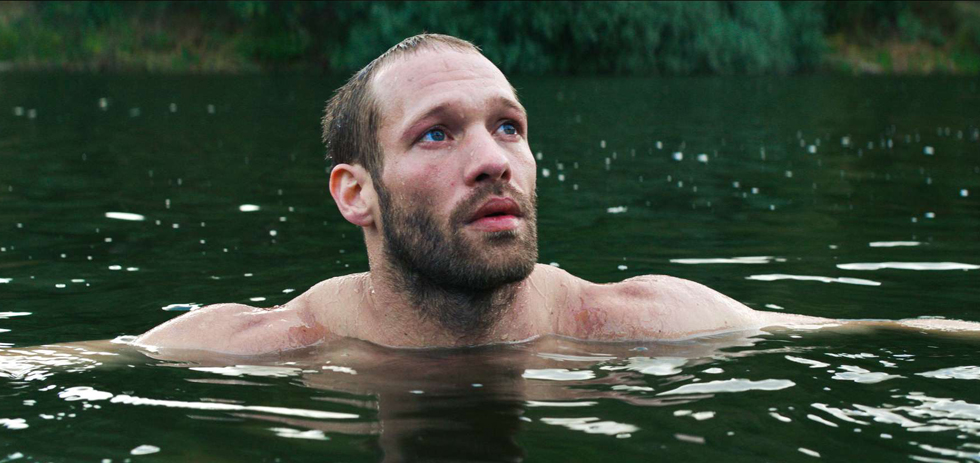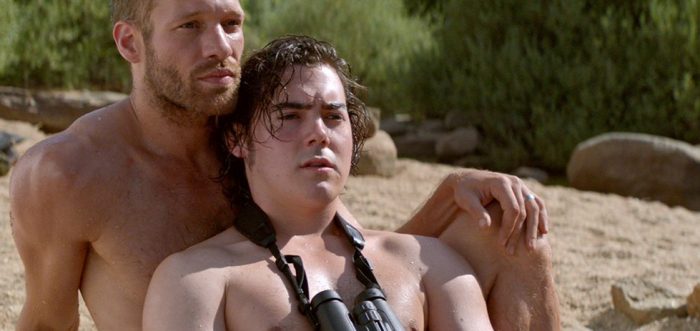
There’s an overwhelming sense of solitude in the way Fernando (Paul Hamy), the titular protagonist of Joao Pedro Rodrigues’ The Ornithologist, is introduced: alone, paddling in his canoe along a river in northern Portugal, looking for black storks. It’s a brilliantly misleading manoeuvre to open the work with—cinematic drones imagine perspectives of the birds, while the enamouring presence of winding forests is portrayed with beautifully saturated images. There’s a slightly ominous atmosphere in a text from his partner reminding him to take his medicine because he “likes him alive”. Beyond that, this is a scene that relishes in a total sense of solace, which becomes more palpable as the film develops into something far more layered, astonishing, and referential. It’s this opening scene that frames so much of what Fernando goes on to experience, as a process of introspection and self-discovery. It’s a clearly unconventional take on solitude, but it simultaneously remains resoundingly tied to the experience, cohering Rodrigues’ film as his most impressive to date.
Fernando’s canoe capsizes in much the same way with the presence of reality in the film. The point after this, where two Chinese travellers (who are en route to Santiago de Compostela on a pilgrimage) find Fernando, informing him that they are lost, sets the course for a significantly different film to the one Rodrigues’ began about fifteen minutes earlier. The Ornithologist operates both as a fractured tale of self-discovery, and an inversion on the myth of Saint Anthony—a markedly queer take on it, which relishes in the idea of blasphemy whilst simultaneously revealing it as inherent in the religious imagery and mythology that Rodrigues’ film is inspired by. From these themes that carry themselves throughout the entire work, to more passing references and focuses, Rodrigues demonstrates an enormous breadth of inspiration throughout The Ornithologist; dramatically widening the scope of his filmography, whilst asserting his legacy as one of Portugal’s most skilled and cognitive directors at the same time.
There are other films referenced throughout The Ornithologist, with the religious themes of Pier Paolo Pasolini’s cinema and Alejandro Jodorowsky’s feverish aesthetics coming to mind. There’s something powerfully distinct in Rodrigues’ film, as it operates with its own intrinsic sense of intimacy and honesty. This is framed by a certain originality, constituted both from new ideas as well as older fascinations touched on in earlier films from the director. The various challenges that Fernando encounters are written with a specificity that evades cliche, maintaining a refreshing and imaginative pace throughout—drawing on religion, sexuality, spiritualism, nature, popular culture, and mythology.
In describing his own film as a “Pasolini Western”, Rodrigues has found a more than appropriate phrase; The Ornithologist fits into such a mould, and draws clear parallels with the Italian director despite operating as very much its own film. Internalising the trajectory of a Western, with challenge after challenge eventually leading to a catharsis, offers a fascinating frame to approach Rodrigues’ film. When Fernando declares “spirits don’t exist”, it’s announced with a tongue-in-cheek sense of foreboding. These supernatural elements within the film, however, are as much a part of the world as they are a product from within Fernando himself.

The religious imagery in the film is rarely incidental. The permutations of mythology, the Bible, and Rodrigues’ own personal interactions with it create an image of a markedly spiritual journey, as well as a decidedly personal one.
The Ornithologist is laden with deeply referential intricacies: Fernando eventually starts being referred to as Anthony, he meets and sleeps with a man named Jesus, and later meets his brother Thomas.1 Rodrigues’ takes the transformative heart of the work further, stepping into the role of Anthony towards the end of the film. The density of these references throughout the work allow Rodrigues to relish in a playful sort of blasphemy in these constant biblical cues. In hinting more explicitly at the eroticism in certain religious imagery and writing, the more metaphysical, queer underpinnings are established within The Ornithologist.
Whether it’s been in O Fantasma, Two Drifters, The Last Time I Saw Macao or To Die Like A Man, Rodrigues’ has consistently threaded aspects of queer life and identity in Portugal into his films, whilst avoiding any sense of pigeon-holing himself in terms of genre or expression in doing so. At the commencement of The Ornithologist, an aforementioned text message exchange establishes Fernando’s sexuality, however, other references to this aspect of the work remain relatively subtle throughout the first half of the film. As The Ornithologist grows into a complex piece, this sexuality is presented as an erotic reprieve from Fernando’s nightmarish encounters, before going on to frame the final scenes. With the only piece of pop music in the film from the Portuguese singer António Variações—one the first public figures in the country to be known to have died in AIDS crisis—the manner in which Rodrigues’ articulates sexuality and identity is clear: with a clear personal element, focused on nuance and subtlety, and positioned as both a fundamental aspect of his work. It results in a stark, lasting, and powerful commentary on sexual identity in Portugal, without ever drawing a direct focus on it.
There’s a stunning depth in all of this, from the influence of religion, the sense of identity, sexuality, to the nature of self-discovery. When Fernando quips early into the film that “spirits don’t exist”, it’s as hard for the viewer to anticipatethe pointedly spiritual odyssey that unfolds as it is for him. Despite being laden with these references, the work never feels particular indebted to a certain reading of religion or spirituality. Rodrigues’ depiction of this introspection creates an immersive and complex work, as well as his most conceptually dense. While it is only the latest in a string of ground-breaking works from the director, The Ornithologist cements Joao Pedro Rodrigues’ legacy as one of Portugal’s greatest filmmakers.
